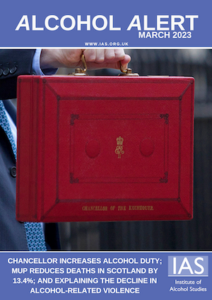In this month’s alert
Spring Budget: Alcohol duty to rise with inflation, but draught duty cut Podcast feature
After a decade of freezing and cutting alcohol duty at each Budget – apart from in 2017 – the UK Government has announced that alcohol duty will rise in line with inflation in August.
At the Spring Budget, the Chancellor Jeremy Hunt announced that alcohol duty would go up with inflation, which stands at 10.1%. In December last year, Hunt had already said that alcohol duty would be frozen for six months up to August 2023, when the alcohol duty reform will be introduced.
Duty is supposed to go up with inflation each financial year, so that it stays the same in real terms. It has instead been frozen or cut each year over the past ten years, apart from 2017 when it did rise with inflation. Freezing or cutting duty has contributed to alcohol becoming more affordable, and the NHS has found that in 2020 it was 14% more affordable than in 2010. It is 72% more affordable than in 1987:
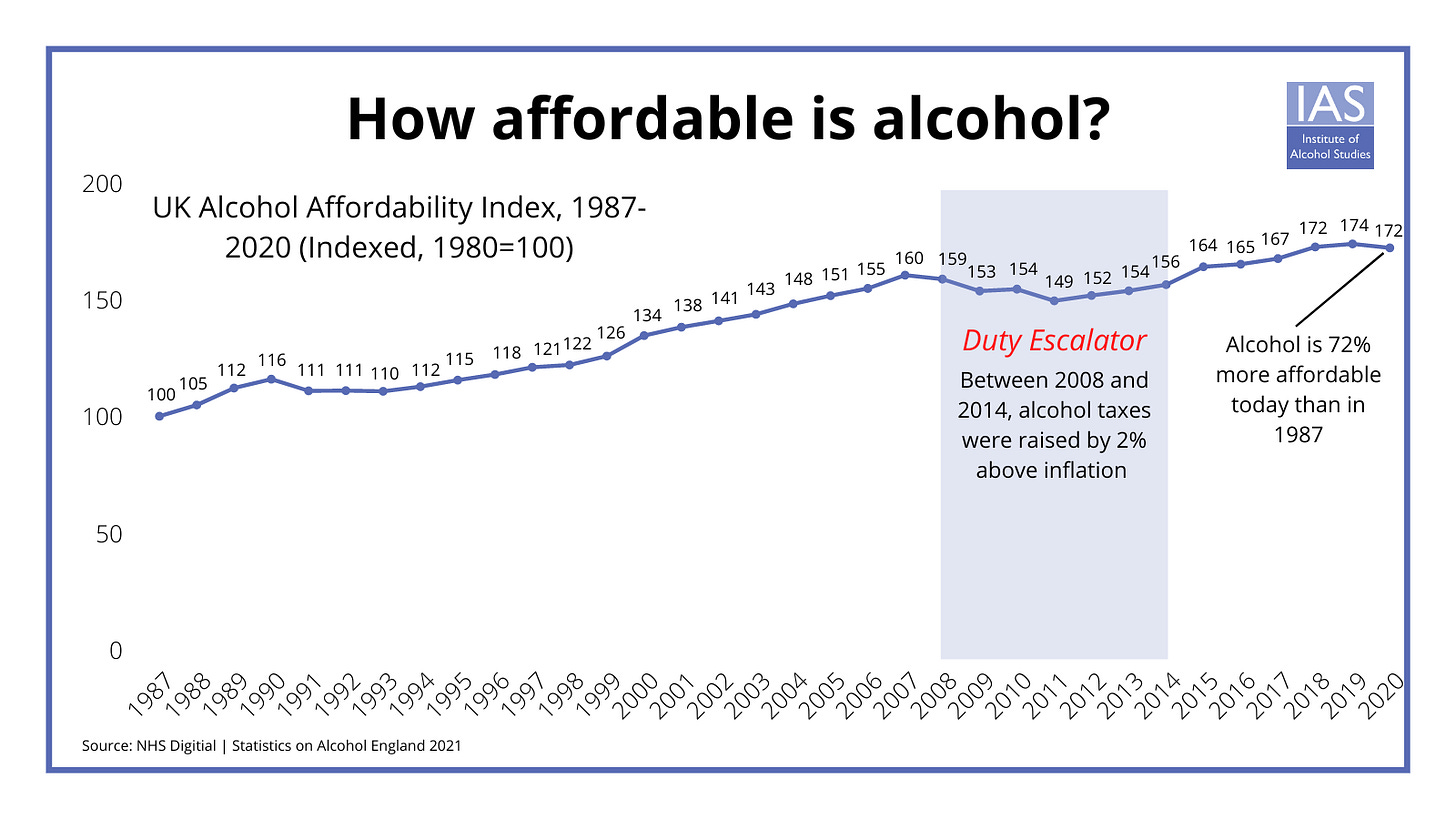
In 2021, then Chancellor Rishi Sunak announced the alcohol duty reform, which included Draught Relief – a duty reduction on certain alcohol sold on draught in the on-trade. At the Spring Budget, it was announced that:
“Draught Relief will increase from 5% to 9.2% for beer and cider draught products and from 20% to 23% for wine, spirits based and other fermented draught products.”
This measure is intended to reduce the disparity in cost between alcohol sold in the on-trade (pubs, bars and restaurants) and the off-trade (supermarkets and off-licenses). Publicans have previously stated that the biggest risk to their business is increased competition from the off-trade.
IAS welcomed the news, with chief executive Dr Katherine Severi stating that:
“Cuts and freezes to alcohol duty have cost the public purse more than £8 billion over the past 10 years. Today’s announcement by the Chancellor that most alcohol duties will rise by inflation will raise revenue for vital public services. We welcome this decision.
“With alcohol deaths at their highest level on record, now is more important than ever to focus on improving health by tackling cheap alcohol. It’s high time the alcohol industry started paying its way towards the cost of alcohol harm.”
The Alcohol Health Alliance also welcomed the increase, with chair Professor Sir Ian Gilmore calling for the revenue raised to be used to fund frontline NHS and alcohol treatment services. He added:
“While the announcement today is a positive move in the right direction, there is still a long way to go to significantly reduce the harm caused by alcohol. To make this and the proposed alcohol duty reform most effective, the government should now follow up by introducing an automatic annual uprating mechanism so that the benefits are not lost through future cuts to duty. This cannot be a one-off increase but needs to be part of a long-term plan to reduce the affordability of alcohol and its harms.”
Very few health bodies were quoted in the media, with newspapers focussing on the perspective of industry bodies. The Scotch Whisky Association (SWA) was highly critical of the decision to increase duty, calling it a “hammer blow” to the industry. Their chief executive Mark Kent said: “it’s bad news for spirits, it’s bad news for Scotch, and it’s bad news for Scotland”. The SWA also said that distillers were “not just livid, but insulted”.
In our podcast, IAS’s chair Dr Peter Rice made the point that industry associations partly create their own problems with this, by raising expectations that duty should be frozen:
“Part of the reason why producers would be so angry is that they were told by their associations to expect that duty would be frozen, when in fact it’s supposed to rise with inflation.”
Defending the rise and responding to the whisky industry criticism, Jeremy Hunt told BBC Radio Scotland that in real terms whisky duty was at its lowest point in 100 years, and the Government would continue to engage with the industry to ensure distillers were “successful and prosperous going forward”.
Regarding the increase in Duty Relief, Wetherspoons’ boss Tim Martin stated that:
“Any reduction in the tax disparity between pubs and supermarkets is welcome. Wetherspoon has been campaigning for tax equality for a long time.”
Emma McClarkin, chief executive of the British Beer and Pub Association (BBPA) also praised the increase in relief but added that:
“the fact is our industry will be facing an overall tax hike, not a reduction, come August. Duty on non-draught beer will rise and the measures introduced today won’t rebalance the catastrophic impact soaring inflation and unfair energy contracts are having on both pubs and the breweries that supply them”.
Minimum unit pricing reduces alcohol deaths by 13.4% Podcast feature
A study in The Lancet from Public Health Scotland and the University of Glasgow has found that minimum unit pricing (MUP) reduced deaths wholly attributable to alcohol by 13.4% in Scotland between April 2018 and December 2020.
The study compared Scottish alcohol deaths to an estimate of the deaths that would have occurred had MUP not been implemented. Although deaths actually increased in Scotland in the period, they didn’t increase at the same rate as in England, which was used as a control.
Reductions in deaths were greatest for men and those living in the 40% most deprived areas, suggesting it is a progressive policy.
Professor John Holmes, Director of the Sheffield Alcohol Research Group, said that this study provides:
“the clearest evidence to date that MUP has reduced the harm caused by alcohol in Scotland.”
One of the study authors, Dr Grant Wyper, a public health intelligence adviser at Public Health Scotland, said:
“The results published are very encouraging in addressing inequality, and the overall scale of preventable harm which affects far too many people.”
Dr Katherine Severi said England must now implement the policy:
“Today’s study shows that action on cheap, strong alcohol saves lives and reduces inequalities. With alcohol-related deaths in England at an all-time high, the Government must introduce MUP to ensure we do not become the sick nation of the UK.”
In her final cabinet meeting as First Minister, Nicola Sturgeon highlighted the policy as one of the actions she was most proud of. In a tweet she said that it was “controversial and difficult but I’m glad we persevered to overcome all the political and court challenges”.
Alison Douglas, chief executive of Alcohol Focus Scotland said that the results were “absolutely amazing” but that MUP must be uprated to continue to be effective during rising inflation. She called on the UK Government to look at the study results and hopefully conclude that the policy will deliver benefit across the UK.
The study did find potential indications that the policy worsened acute outcomes for deaths and hospitalisations, such as alcohol poisoning. However, this was outweighed by the lives it saved and the finding was not statistically significant. The authors say that a possible reason is that some groups reduced their food intake in order to afford alcohol, which may have led to quicker intoxication or poisoning. Discussing the point, the authors state that:
“These findings underscore the importance of ensuring timely, accessible services for those dependent on alcohol to coincide with the implementation of population-level policies.”
One criticism of the study, by statistician Professor Kevin McConway at The Open University, was that the study includes “a lot of causal interpretation”. He says that as it is an observational study, it can never prove that changes in deaths were due to MUP. However – in the absence of a randomised control trial – a strong study design such as this, complemented by the results of a number of modelling and real-life studies, provides a large body of evidence that can suggest a causal relationship. In addition, there were no other alcohol policy changes that would otherwise explain the difference in alcohol death trends between Scotland and England.
Public Health Scotland will bring together the conclusions of various reports later this year, which will feed into the Scottish Government’s final report on the policy. MUP will expire at the end of April 2024, unless the Scottish Government decides to continue it.
Humza Yousaf says he is “minded” to scrap the alcohol marketing consultation
In an interview with the Daily Record during the leadership contest in Scotland, incoming First Minister Humza Yousaf said that as the alcohol marketing and promotion consultation has “concerned” businesses, he would be minded to withdraw it. However, he added: “but let me make it absolutely clear, with the absolute determination to bring that consultation forward, once again”. He said the Government should push ahead with advertising restrictions but that:
“I think there’s often a lot of misinformation around particular issues that affect business and I think we’ve got to make sure that if we are producing a consultation that is ultimately going to affect business, we’re doing it in a way where we explain before the consultation goes out, what it is we’re trying to do.”
Responding to this in a tweet, SNP MP Stewart McDonald expressed concern regarding Yousaf’s comments:
Dr Alastair MacGilchrist of SHAAP urged Yousaf to “stand firm” on the consultation and warned against “caving in” to “far-fetched claims” by the industry.
“When you think of France, which has alcohol marketing restrictions, you certainly don’t think of a country whose tourism and hospitality industries are struggling to attract customers.
“Could it be that the alcohol industry is getting so upset because marketing works? That it invests billions in marketing because it drives sales and consumption, and grows their profits?”
In related news, Yousaf said he would consider increasing the 50p rate of MUP, to reflect “emerging evidence, inflation, people’s incomes and alcohol affordability”.
Explaining the decline in alcohol-related violence
Between 2010 and 2020, overall levels of alcohol-related violence have fallen considerably, from over 1 million to just over 500,000. This happened alongside broader declines in violence, yet declines in alcohol-related violence have been steeper.
Number of violent incidents reported to the CSEW which were alcohol-related
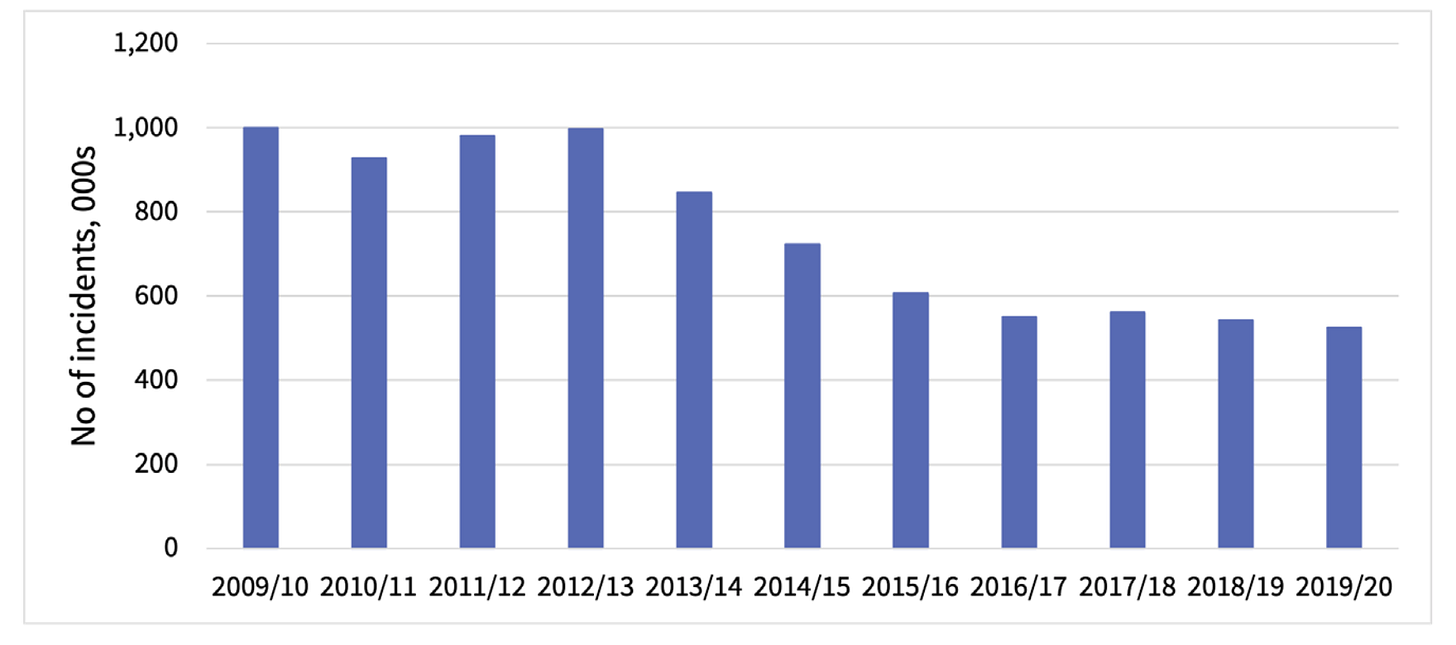
In our latest report we explored these recent declines in alcohol-related violence in England and Wales.
We found that declines in youth drinking may contribute to the overall decline. Not only do both declines align to some degree, but also violence in the night-time economy generally involves younger age groups.
The report also found that declines in alcohol-related stranger and acquaintance violence drove the recorded declines in alcohol-related violence overall to the greatest degree. As both types of violence have fallen – from 63% to 54% and 54% to 35% respectively – this could help explain the steeper fall in alcohol-related violence compared to overall violence.
The findings should not encourage complacency though, as over half a million incidents is still a worrying number. Further, figures on domestic violence are very likely to be an under-estimation and therefore an under-reporting of the proportion of domestic violence compared to overall violence.
Read author Lucy Bryant’s blog which explains the study and its findings.
Moving towards new political and economic models
The Lancet has published a new series that looks at the commercial determinants of health. The series provides recommendations and frameworks to better understand the commercial world and potential pathways to health harms or benefits. It also highlights the need for regulatory action and investment into actions that improve health and wellbeing.
The series includes a commentary by Dr Tedros Ghebreyesus – the Director General of the World Health Organization – who writes:
“Much of our international system—in trade, finance, and even development—supports the drive for ever-increasing profits and economic growth over the social, environmental, and health impacts of commercial products or practices.
“When profits are threatened, some companies and other actors with vested commercial interests deliberately undermine public health policies, including WHO guidance, through lobbying, legal threats, ineffective self-regulation, distorting evidence, concealing their practices, and other actions.”
Professor Anna Gilmore of University of Bath, who led the research, explained what she ultimately wants to see from the series:
“A move towards new political and economic models that work to sustain, rather than damage, people and planet. Models in which public interests are prioritised over private interests, and where, ultimately, commercial organisations work to enhance global health.”
In related news, Dr Nason Maani (University of Edinburgh), Professor Mark Petticrew (LSHTM), and Professor Sandro Galea (Boston University) recently edited a book on the commercial determinants of health, which is the first book to consolidate the issue as a distinct research and policy topic across sectors.
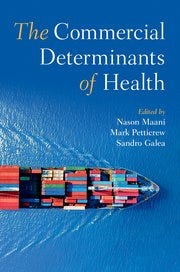
Experts give their verdict on alcohol treatment services and harm
On Thursday 02 March, Professor Sir Ian Gilmore gave evidence to the Public Accounts Committee about alcohol treatment services and harm. The select committee “is responsible for overseeing government expenditures, to ensure they are effective and honest”.
Joining Prof Gilmore were Clare Taylor of Turning Point, Professor Dame Carol Black, and Alice Wiseman of Gateshead Council, representing the Association of Directors of Public Health.
We’ve collated highlights from the evidence session.
Alice Wiseman “politely disagreed” with civil servant Sir Chris Wormald that evidence around alcohol harm reduction is contested, and explained the depth of evidence around pricing, availability and marketing:
Prof Gilmore highlighted how alcohol harm puts pressure on all parts of our health service:
He also answered the question ‘Does minimum unit pricing work?’:
Clare explained that better integrated care, sustained investment, and collective working will help address the unmet need for treatment:
Alice highlighted that the idea of “drinking responsibly” can act as a barrier to accessing treatment:
And finally, Labour MP Dan Carden – who convened the committee meeting – questioned why there is no strategy when alcohol causes so much harm:
Alcohol Toolkit Study: update
The monthly data collected is from English households and began in March 2014. Each month involves a new representative sample of approximately 1,700 adults aged 16 and over.
See more data on the project website here.
Prevalence of increasing and higher risk drinking (AUDIT-C)
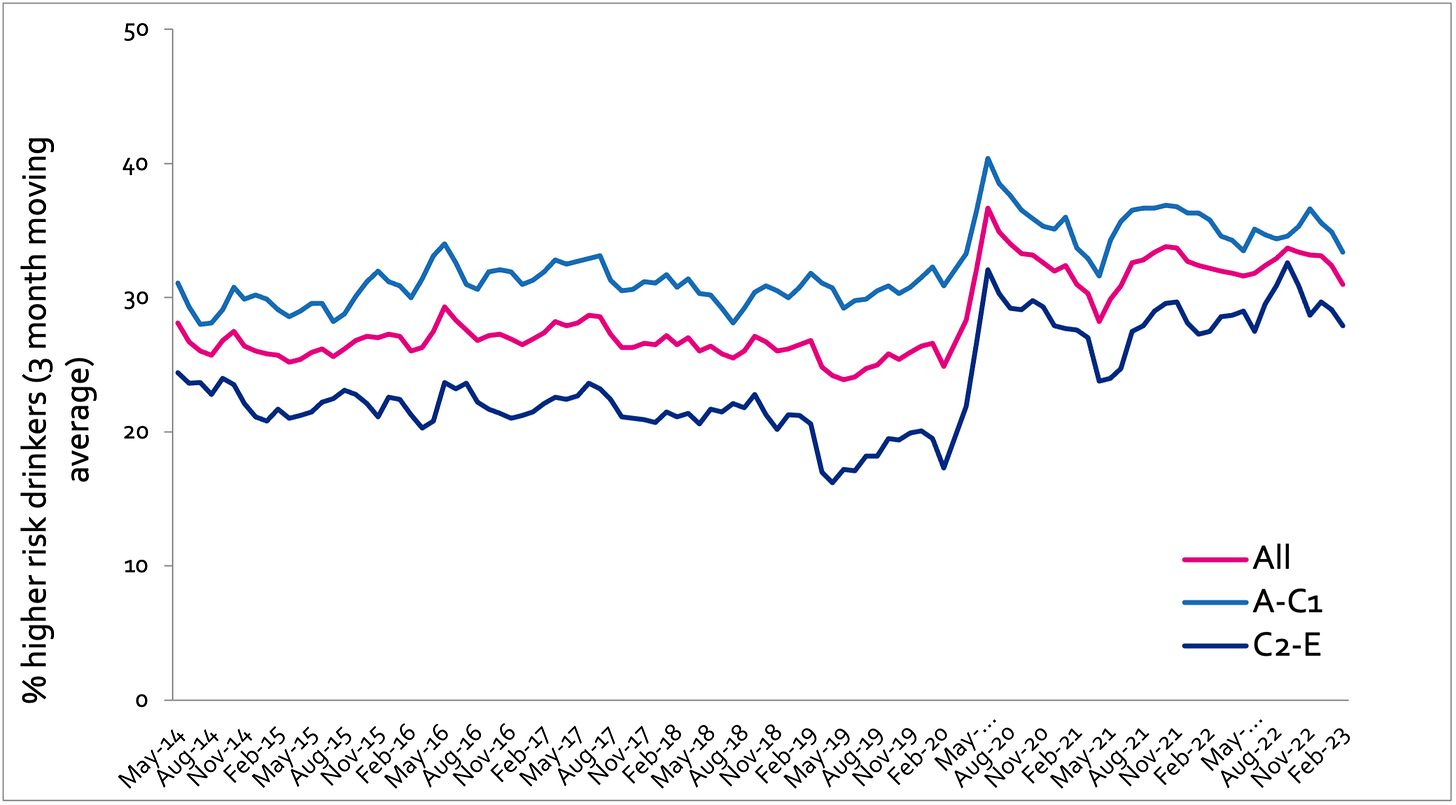
Increasing and higher risk drinking defined as those scoring >4 AUDIT-C. A-C1: Professional to clerical occupation C2-E: Manual occupation
Currently trying to restrict consumption
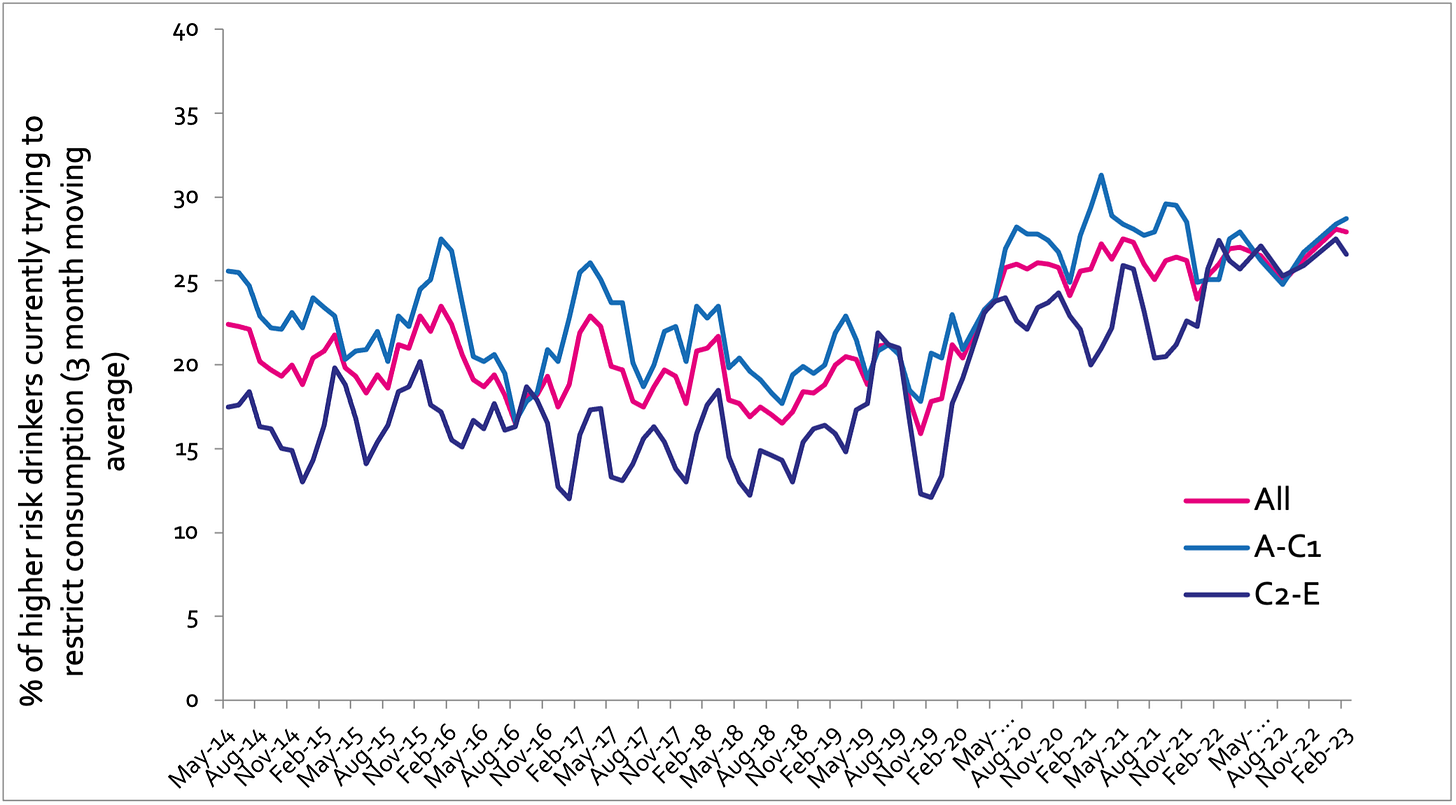
A-C1: Professional to clerical occupation C2-E: Manual occupation; Question: Are you currently trying to restrict your alcohol consumption e.g. by drinking less, choosing lower strength alcohol or using smaller glasses? Are you currently trying to restrict your alcohol consumption e.g. by drinking less, choosing lower strength alcohol or using smaller glasses?
Serious past-year attempts to cut down or stop
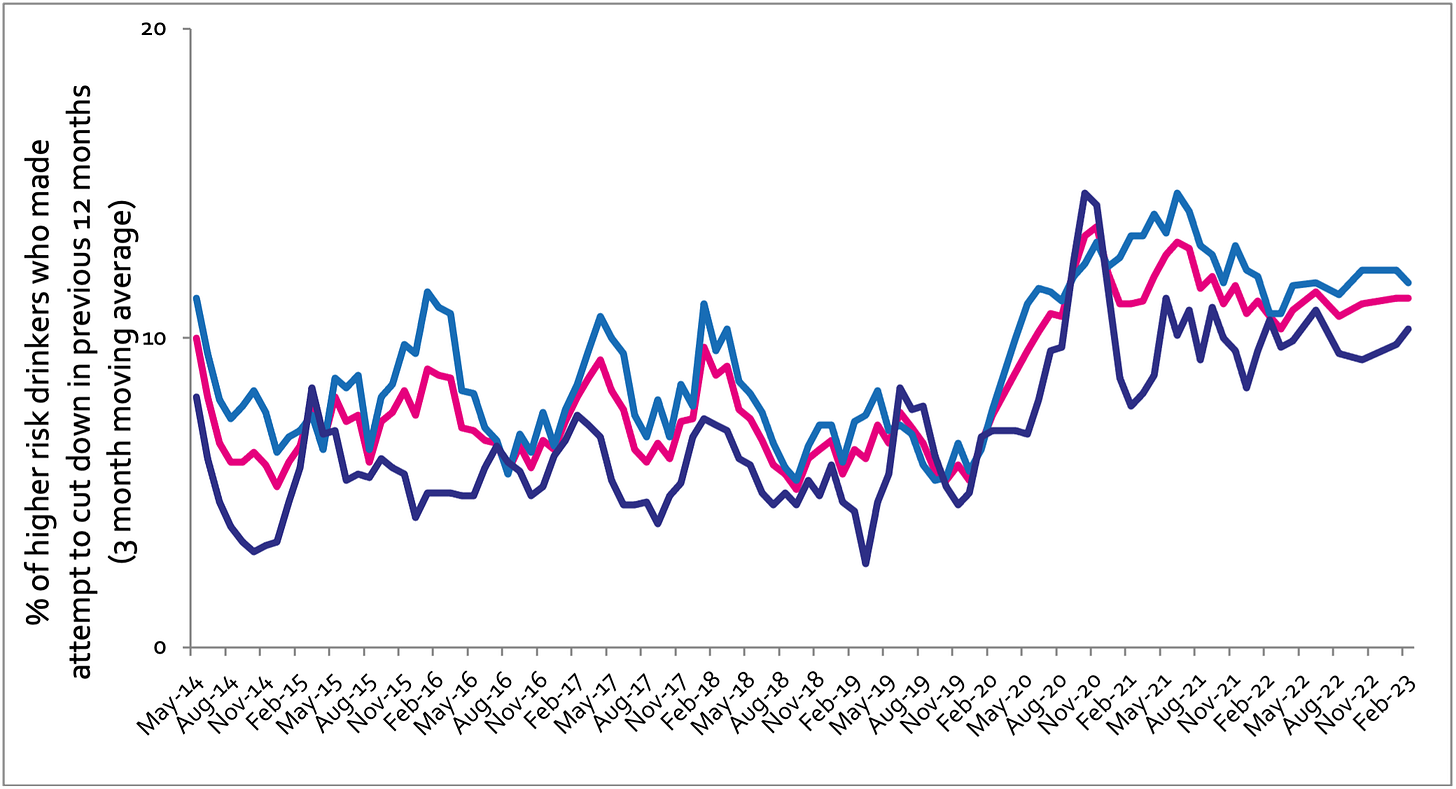
Question 1: How many attempts to restrict your alcohol consumption have you made in the last 12 months (e.g. by drinking less, choosing lower strength alcohol or using smaller glasses)? Please include all attempts you have made in the last 12 months, whether or not they were successful, AND any attempt that you are currently making. Q2: During your most recent attempt to restrict your alcohol consumption, was it a serious attempt to cut down on your drinking permanently? A-C1: Professional to clerical occupation C2-E: Manual occupation
Podcast
Our monthly podcast features interviews with experts from across the sector.
How to shift the dial on alcohol policy in Europe
Florence Berteletti –
Eurocare
Anamaria Suciu –
Eurocare

